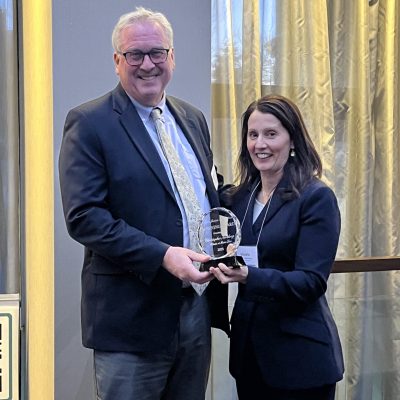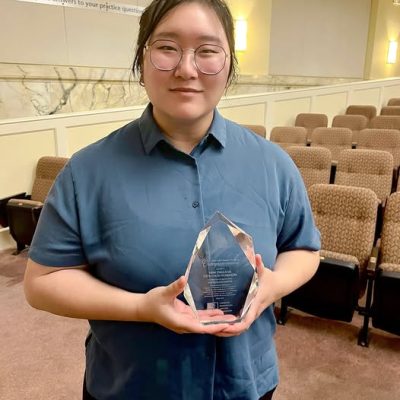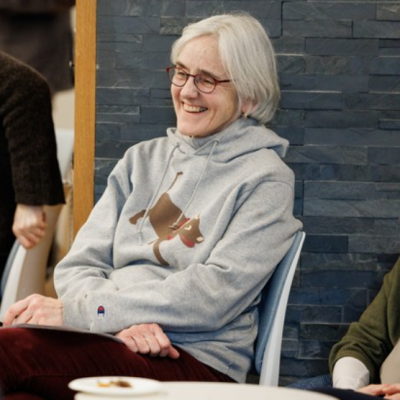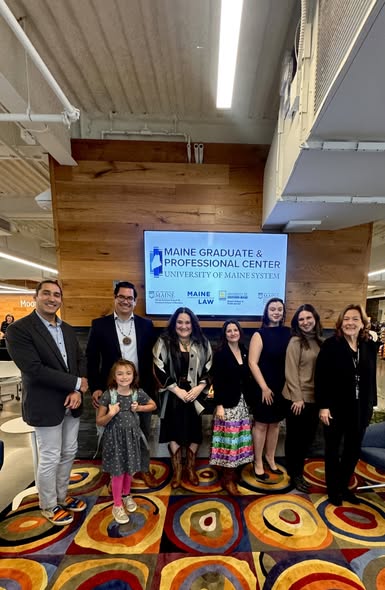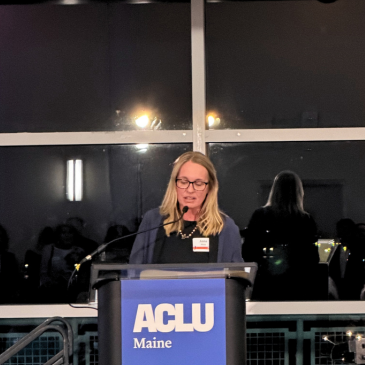 In 2002, Valerie Stanfill ’85, then the acting Director of the Cumberland Legal Aid Clinic (CLAC), approached Jim Burke with an innovative idea: what if Maine Law students could help provide the legal assistance to which so many prisoners lacked access? At that time, Burke had practiced law for 30 years and worked extensively with the ACLU of Maine on a variety of issues, including prisoners’ rights. He describes the impetus behind his life’s work this way: “My general philosophical bent is toward the underdog.”
In 2002, Valerie Stanfill ’85, then the acting Director of the Cumberland Legal Aid Clinic (CLAC), approached Jim Burke with an innovative idea: what if Maine Law students could help provide the legal assistance to which so many prisoners lacked access? At that time, Burke had practiced law for 30 years and worked extensively with the ACLU of Maine on a variety of issues, including prisoners’ rights. He describes the impetus behind his life’s work this way: “My general philosophical bent is toward the underdog.”
Stanfill was seeking a director who could make a Prisoner Assistance Clinic (PAC) a reality, and Jim Burke was a perfect fit for the role.
When Burke retired in the summer of 2019, he wasn’t simply ending a distinguished career as a clinical professor whose students almost universally speak of him in “glowing terms,” according to his colleagues. Leaving Maine Law meant moving on from a role he had spent years lovingly cultivating.
“Jim really built the PAC from scratch — he had no models to work from,” says Deirdre Smith, professor of law and director of the CLAC. For more than 15 years, this innovative program has assisted hundreds of prisoners annually with civil legal matters, while providing students with what many have described as the single most enriching educational experience they’ve had. Clinical Professor Christopher Northrop describes the PAC as providing far more than legal education: “It touches and improves the lives of each student and every client.”
Scott Dolan ’19 credits Burke and the PAC with truly teaching him how to practice law, far beyond what he could learn in classes. Burke’s familiarity with Maine’s legal world was an enormous advantage to his Clinic students, says Dolan. “He had experience in criminal law, probate, family law, civil litigation — he knew it all. For a newbie, it was so comforting. You knew exactly what to expect, where to stand, and what to say.”
“It’s hard to put into words how influential Jim Burke was to my legal education and career,” says Ryan Rutledge ’19, who also served as a PAC student attorney. “My experience there was nothing short of incredible. I went to law school because I wanted to help people, and the Prisoner Assistance Clinic allowed me to work with people who truly needed my help.”
While the PAC has evolved over the years, its basic premise has remained the same. Each semester, five third-year law students are sworn in as attorneys. They travel weekly to the Maine Correctional Center in Windham with a faculty supervisor, where they meet with any prisoner who needs help with a civil legal matter. Some of the issues these clients face include custody and child support, probate, bankruptcy, insurance law, and even copyright law and other business concerns.
The PAC provides students with extensive practical experience in a wide variety of legal areas. “When you run into a lawyer who hasn’t met the PAC students before and they start realizing the level at which they’re working, they’re flabbergasted,” says Burke. Smith says that learning to “interview, counsel, and talk to people” is the centerpiece of their experience, adding “I don’t know a better way to develop compassion and break down prejudices than sitting down and hearing people’s stories.”
The Maine Department of Corrections has been a vital partner in this project all along, in large part thanks to what Smith describes as Burke’s tireless dedication to that relationship. “The DOC recognizes what a huge benefit the PAC is for them,” she says.
Burke says, “I’ve been told at the prison that we provide a service so valuable that it saves them from having to hire counselors and extra guards.” While providing greater access to justice for an underserved group and empowering them to advocate for themselves, this work also benefits the entire state, increasing the odds that prisoners will successfully reintegrate into their communities — all while improving day-to-day life for both inmates and prison staff.
“Maine would be much worse off without the PAC,” says Rutledge. “Law students need practical experience, and underprivileged and vulnerable Mainers deserve quality legal representation. Everybody wins.”
The Prisoner Assistance Clinic will continue its work, providing an exceptional learning opportunity to students and helping an incarcerated population that’s often overlooked by society.
In early January, Courtney Beer ’07, formerly the directing attorney at the Pine Tree Legal Assistance Kids Legal Program, will take the helm as director. Interim Dean Dmitry Bam says, “We were so fortunate to find Courtney — she’s well known and well respected in Maine, and she’ll bring many years of practice experience into the Cumberland Legal Aid Clinic.”
Beer is very familiar with Burke’s legacy and CLAC’s mission.“To say it’s an honor to follow in Jim’s footsteps is an understatement,” she says. “My experience as a student attorney in CLAC was one of the most influential experiences I had in law school. I am honored to be afforded the opportunity to continue to build and support a clinical program that provides students with learning opportunities to develop essential lawyering skills while providing incarcerated individuals critical access to civil legal services.”
Still, Jim Burke’s absence will be sorely felt. “Jim was a great clinical professor because not only did he teach a generation of students to be outstanding lawyers, he taught all of his students invaluable lessons about humility and humanity,” says Northrop. Dolan says Burke taught him that every client, no matter their circumstances, deserves the same level of help. “Jim would actually say, ‘Find love in your heart for everyone,’ and he was someone who truly practiced what he preached.” Reflecting on life after Maine Law, Burke says, “I’ll miss the students most of all. What could be better than helping people learn how to do good work?”

